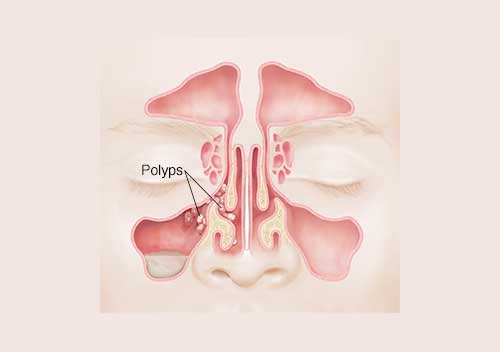Nasal Polyps

New Patient Visit
Initial Visit
Workup
After arriving at a presumptive clinical diagnosis, nasal endoscopy is performed to visualize the nasal polyps and document the extent of disease. Diagnostic imaging with a CT Scan of the Sinus is also performed to assess the relationship of your polyps to your orbital and intracranial cavities. Lastly, allergy testing is performed to determine the extent of allergies involved in causing your nasal polyps.
Treatment
Nasal Polyps FAQ
What are the most common symptoms associated with Nasal Polyps?
Many patients complain mostly of lack of smell and nasal congestion. These are hallmarks of nasal polyps.
I have had numerous surgeries and medications for my polyps but they keep recurring. What are my options?
Dupixent(dupilumab) injection therapy is a biologic that is successful in treating cases of nasal polyps resistant to surgery and medical therapy. We have placed patients on this with excellent results.
How does Dupixent injection therapy work?
Dupixent(Dupilumab) is a biologic injection given every other week that acts as an inhibitor of interleukin-4 (IL-4) and interleukin-13 (IL-13) which are key drivers in the inflammatory response that causes nasal polyps to develop. It was approved for use in the summer of 2019 by the FDA for use in patients with polyps. See our Press Release(LINK) for more information.
Will my polyps turn into cancer?
Nasal Polyps are a benign growth that results from inflammation. They are not cancerous. However, there are other benign nasal growths such as papillomas that can turn malignant over time. They are usually unilateral in nature. A proper endoscopic exam can differentiate between both disorders.
How extensive is surgery for nasal polyps?
It depends on the extent of your polyps. Many procedures are performed in our office under local anesthesia. If your polyps are advanced, we utilize general anesthesia and image guided surgery to remove your polyps in a safe, effective fashion.
